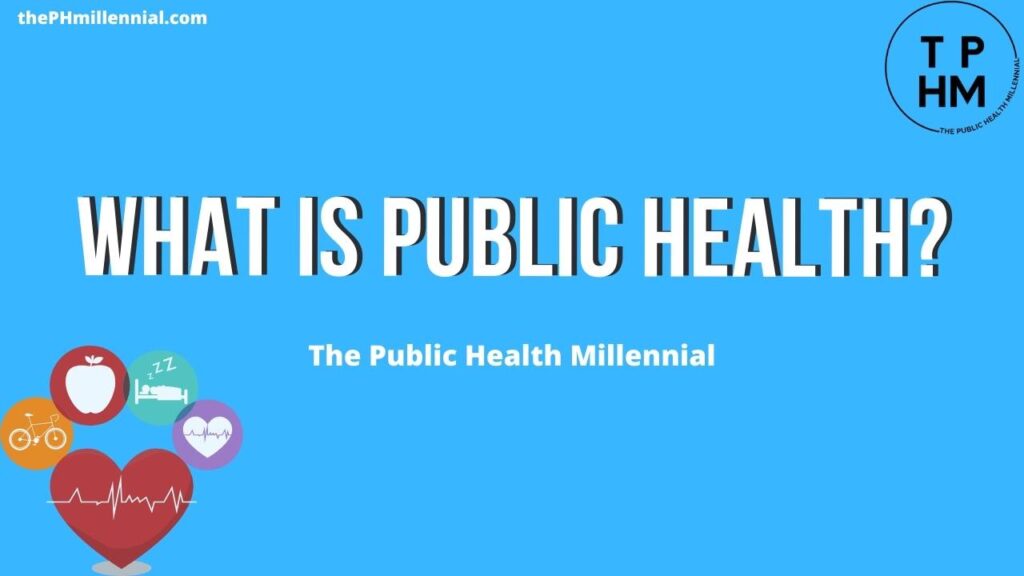Public health has increased US life expectancy (by 25 years since 1900).
Public health is a cheat-code for making everyone healthier.
After years of wanting to be a physician, I came across a field of work that impacts the upstream factor of health – at a population level. That field is public health.
Public health is important because it:
- Improves the health of populations
- Addresses root causes of health issues
- Focuses on prevention of disease rather treatment

(Join early access waitlist for community launch | Check out Black Maternal Health Conference)
What is Health (and the determinants of health)?
‘Health’ comes from the old english word ‘hale’ – which means “wholeness; a thing that is complete; healthy.”
The World Health Organizations defines health as:
‘Health is a state of complete physical, mental and social well-being and not merely the absence of disease or infirmity’
There is still much debate on the concept of health. And health means different things to different people. No matter what your perspective on health – health is at the foundation for all individual self-realization.
The determinants of health are the conditions surrounding the places where people are born, live, work, play, worship, vote, and age that affect their health.

Health is the complex interactions of the determinants.
- Social determinants of health – the places we live, work, play, and live affect health.
- Political determinants of health – how government, policy, and commercial interest affect health.
- Structural determinants of health – how economic systems, social systems, and structural discrimination affect health.
All people (and communities) are interacting with the dynamic systems that surround their daily lives. Health of communities is determined through the overlapping interactions of various determinants of health.
What is Public Health (and how does it work)?
Public health is the science and art of preventing disease, prolonging life and promoting health, through organized efforts.

The American Public Health Association’s goal is “promoting and protecting the health of people and the communities where they live, learn, work, and play.”
While physicians are interested in individual treatment, public health is focused on health at population levels.
Public health looks at the determinants of health which act at the level of the population – in a community. Communities can be considered neighborhoods, cities, counties, regions, states, or countries. Public health then tries to affect those determinants so that there is ultimately health improvement of individuals who constitute a community.
Public health is not about disease diagnosis, individual treatment, or care management.
Public health is about improving the societal level determinants of communities.
Public health is about creating equitable systems for communities.
Public health is about collectivism and community.
The history of public health can be traced back to the 1700s (more to come on this later this year).
To me, public health is a framework and a way to make equitable improvements to communities that have been historically marginalized and disinvested. In this, I have found much joy in working in public health.
HOW PUBLIC HEALTH WORKS
Public health works in complex ways to protect and improve the health of people and their communities. Public health is concerned with with protection of health for entire populations.
Public health achieves its goal by:
- Promoting healthy lifestyles
- Advocating for health first policies
- Researching disease and injury prevention
- Detecting, preventing, and responding to infectious disease
There are 3 core areas of public health: protection, prevention, and promotion. These are the guiding principles that define public health careers.

Protection – focused on protecting the health of the population.
- Control of infectious diseases
- Creating healthy and safe workplaces
- Managing and mitigating health emergencies
- Managing environmental hazards and injustices
Prevention – focused on preventing health issues before diseases occur.
- Vaccines and immunization programs
- Screenings and cessation interventions
- Policy that reduces negative health related incidents
Promotion – focused on improving the health of populations.
- Addressing social determinants of health
- Advocating for equitable policy and systems change
- Promoting health behaviors and lifestyles at the community level
Who Is Responsible for Public Health?
Public health professionals try to prevent problems from occurring or reoccurring through programs, policies, services, and research.
A public health expert is anyone who address health at the population level. Many jobs that may not be considered “public health jobs” still contribute to efforts to promote healthier communities. This covers engineering to ensure clean water systems to teachers educating the future leaders in class (education is a determinant of health).
Public health spans and touches just about every aspect of society. This is because, as we learnt, health is dynamic and affected by many determinants of health.
Agencies responsible for public health are:
- Government
- Community
- Health departments
- Nonprofits
- Private sector
Some may think public health is the sole responsibility of government and health departments. In reality, public health is the responsibility of many interdisciplinary fields that work collaboratively or tangentially to improve population’s health. The skillset that someone in public health attains is marketable to many industries.
In order for public health to be effective, it must work across sectors and center community voice.
If you want to learn more about various careers in public health, check out Public Health Careers podcast for diverse career stories.
Difference between clinician and public health practitioner
To differentiate the public health approach from physician approach, I’ll share an example of cardiac arrest. Then highlight the physician, public health practitioner, and social scientist perspectives.
A physician would claim that a cardiac arrest was caused by a blockage in the patient’s heart. They conclude the cause of death was the cardiac arrest.
A public health practitioner would claim that the cardiac arrest was caused by the patient cigarette consumption habit. They have been a cigarette smoker since age 18. They conclude that smoking was the cause of the patient’s premature death.
A social scientist would claim that the patient lived in a poor neighborhood, smoked cigarettes because they felt stressed from poverty, had low education/literacy levels, and became addicted to smoking. They developed initial cardiac issues, but didn’t have affordable health care or access to insurance so there were not seen for the initial problem, the problems worsened and the patient died. They conclude that the cause of death was poverty.
Public health works in between the public health practitioner and social scientist. The true goal is to understand the social circumstances that cause poor health and address those root causes to improve health (at a population level).
Clinicians look at the individual conditions of the patient. Public health looks at the external conditions affecting health.
Public health looks at the:
- Immediate health cause
- Combination of causes
- Causes of the causes
Public health is not only concerned with the why behind a problem. They are also concerned with the “why behind the why” and the “why of the why of the why.”
The public health practitioner asks the questions, “Could this problem have been prevented? Which part of the system failed this community? What are the root causes that led to this issue?”
Why Work in Public Health?
There are several compelling reasons why you may choose to work in public health. If you want to learn more about public health professional journeys, check out Public Health Careers podcast.
Impact
Public health professionals have the opportunity to make a significant impact on the health and well-being of communities, both locally and globally. By addressing the challenges and needs of populations over individuals – there is a potential for large population level impact in public health.
Community Focus
Public health work often involves engaging directly with communities to understand their health needs and develop targeted interventions. This focus on community empowerment and collaboration can be highly rewarding for those who are passionate about making a difference at the grassroots through policy levels.
Diverse Career Paths
Public health offers a wide range of career paths and opportunities for specialization. Whether your interests lie in data analysis, community organizing, health communication, or another area, there are diverse avenues to pursue within the field of public health.
Interdisciplinary Approach
Public health is inherently interdisciplinary, drawing on knowledge and expertise from fields such as epidemiology, biostatistics, environmental health, sociology, anthropology, and policy. This multidisciplinary nature appeals to individuals who enjoy working at the intersection of different disciplines and applying diverse perspectives to complex health challenges.
Social Justice & Equity Focused
Public health is closely linked to social justice and equity, as it seeks to address disparities and inequities in health outcomes that are often driven by social, economic, and environmental factors. If you are committed to promoting fairness and equity in health, you may find public health work particularly fulfilling.
Public Health Milestones
Public health is responsible for the 25 years of life expectancy gain in the US since 1900. Only 5 years of life expectancy gain is directly attributed to improvements in medicine.
Public health has achieved many milestones through the years.
The 10 Great Public Health Achievements in the US, 2001-2010 are:
- Vaccine-preventable diseases
- Prevention and control of infectious diseases
- Tobacco control
- Maternal and infant health
- Motor vehicle safety
- Cardiovascular disease prevention
- Occupation safety
- Cancer prevention
- Childhood lead poisoning prevention
- Public health preparedness and response
Public health has accomplished so much in improving populations health. Yet, there is still much work to be done in public health and in health improvement.



